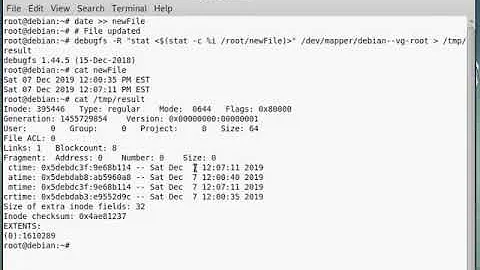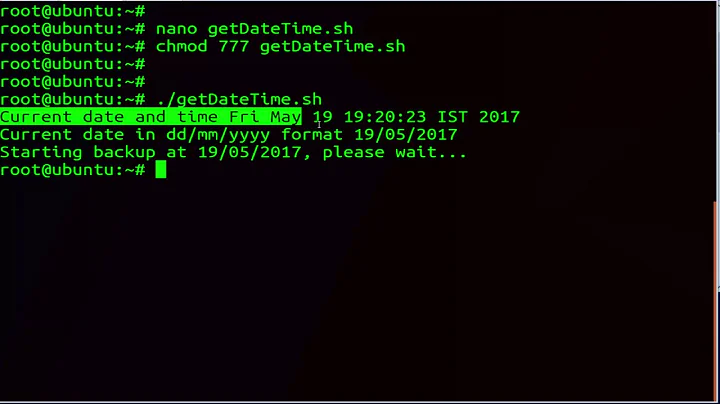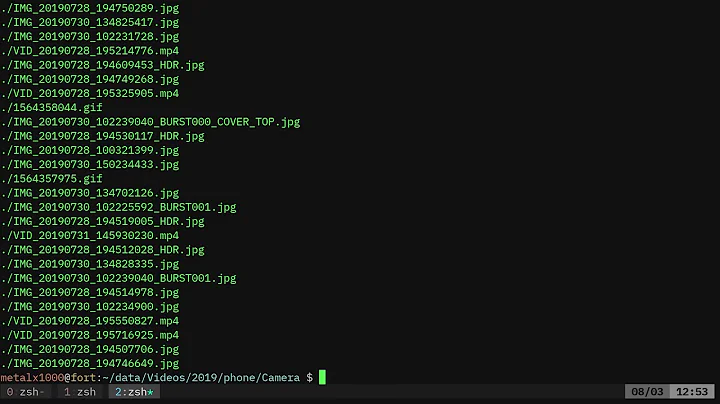How to get file creation date/time in Bash/Debian?
Solution 1
Unfortunately your quest won't be possible in general, as there are only 3 distinct time values stored for each of your files as defined by the POSIX standard (see Base Definitions section 4.8 File Times Update)
Each file has three distinct associated timestamps: the time of last data access, the time of last data modification, and the time the file status last changed. These values are returned in the file characteristics structure struct stat, as described in <sys/stat.h>.
EDIT: As mentioned in the comments below, depending on the filesystem used metadata may contain file creation date. Note however storage of information like that is non standard. Depending on it may lead to portability problems moving to another filesystem, in case the one actually used somehow stores it anyways.
Solution 2
ls -i file #output is for me 68551981
debugfs -R 'stat <68551981>' /dev/sda3 # /dev/sda3 is the disk on which the file exists
#results - crtime value
[root@loft9156 ~]# debugfs -R 'stat <68551981>' /dev/sda3
debugfs 1.41.12 (17-May-2010)
Inode: 68551981 Type: regular Mode: 0644 Flags: 0x80000
Generation: 769802755 Version: 0x00000000:00000001
User: 0 Group: 0 Size: 38973440
File ACL: 0 Directory ACL: 0
Links: 1 Blockcount: 76128
Fragment: Address: 0 Number: 0 Size: 0
ctime: 0x526931d7:1697cce0 -- Thu Oct 24 16:42:31 2013
atime: 0x52691f4d:7694eda4 -- Thu Oct 24 15:23:25 2013
mtime: 0x526931d7:1697cce0 -- Thu Oct 24 16:42:31 2013
**crtime: 0x52691f4d:7694eda4 -- Thu Oct 24 15:23:25 2013**
Size of extra inode fields: 28
EXTENTS:
(0-511): 352633728-352634239, (512-1023): 352634368-352634879, (1024-2047): 288392192-288393215, (2048-4095): 355803136-355805183, (4096-6143): 357941248-357943295, (6144
-9514): 357961728-357965098
Solution 3
mikyra's answer is good.The fact just like what he said.
[jason@rh5 test]$ stat test.txt
File: `test.txt'
Size: 0 Blocks: 8 IO Block: 4096 regular empty file
Device: 802h/2050d Inode: 588720 Links: 1
Access: (0664/-rw-rw-r--) Uid: ( 500/ jason) Gid: ( 500/ jason)
Access: 2013-03-14 01:58:12.000000000 -0700
Modify: 2013-03-14 01:58:12.000000000 -0700
Change: 2013-03-14 01:58:12.000000000 -0700
if you want to verify wich file was created first,you can structure your file name by appending system date when you create a series of files.
Solution 4
Note that if you've got your filesystem mounted with noatime for performance reasons, then the atime will likely show the creation time. Given that noatime results in a massive performance boost (by removing a disk write for every time a file is read), it may be a sensible configuration option that also gives you the results you want.
Solution 5
Creation date/time is normally not stored. So no, you can't.
Related videos on Youtube
Comments
-
NoodleFolk almost 3 years
I'm using Bash on Debian GNU/Linux 6.0. Is it possible to get the file creation date/time? Not the modification date/time.
ls -lh a.txtandstat -c %y a.txtboth only give the modification time.-
William Pursell over 11 yearsAre you using a filesystem that records creation time? Most don't.
-
 John Red about 8 years
John Red about 8 years
-
-
allyourcode over 10 yearsWhen I do stat myfile.txt, I get another row: Birth. Unfortunately, it has no value. Why is that row there?
-
mokalan over 10 yearsctime is not the creation time, it's the "time of last modification of the file status information"
-
Luca Davanzo about 10 yearswhat's the meaning for ctime, atime and mtime?
-
 indivisible about 10 years@Velthune Creation time, Access time, Modification time. However depending on the way the filesystem is configured these values may or may not be accurate. For instance, many people disable writing last access time to files to save on the extra disk writes.
indivisible about 10 years@Velthune Creation time, Access time, Modification time. However depending on the way the filesystem is configured these values may or may not be accurate. For instance, many people disable writing last access time to files to save on the extra disk writes. -
ingyhere over 9 yearsctime = "change time" where change means modification of owner, group, privileges or some other attribute. It's not necessarily the creation time.
-
ingyhere over 9 years@indivisible: FALSE! POSIX standards define ctime as change time. This is when some file attribute changes, generally.
-
jake over 9 yearsI can't vouch for the performance boost, but I read a guide for SSD's that recommended noatime, so this worked for me.
-
 froggythefrog over 9 yearsSuch sad news. It'd be so useful right now to determine easily whether a file has been deleted and recreated or has been there all along.
froggythefrog over 9 yearsSuch sad news. It'd be so useful right now to determine easily whether a file has been deleted and recreated or has been there all along. -
bartgol about 9 yearsI don't know the standards, but the ctime here is after the atime. I would assume creation time should be the oldest...
-
 johk95 about 9 yearsDo you know how that works on a Mac? The Finder shows three timestamps as 'Created', 'Modified', 'Last openend'...
johk95 about 9 yearsDo you know how that works on a Mac? The Finder shows three timestamps as 'Created', 'Modified', 'Last openend'... -
mikyra over 8 yearsStrongly dependant on the filesystem used. But good point anyways. :)Tried to add the missing information to the post.
-
RonJohn over 6 yearsWhat's the difference between change time and modification time?
-
PJSCopeland about 6 years
ctimeis the time the directory information was updated;mtimeis the time the file itself was updated. -
truf about 5 yearsIt seems
ls -ldisplays Modify time, not Creation or Birth time -
 user9074332 almost 5 years
user9074332 almost 5 years$ /usr/bin/find -newerBt '2014-06-13' /usr/bin/find: This system does not provide a way to find the birth time of a file. /usr/bin/find: invalid predicate-newerBt'` -
MaXi32 over 3 yearsIt is a placeholder for another file system that able to store creation date.
-
Jesse Chisholm almost 3 yearsNot pleasing to most because it requires
sudoanddebugfs. -
Alex78191 over 2 years@mikyra ext4 stores the creation date.








